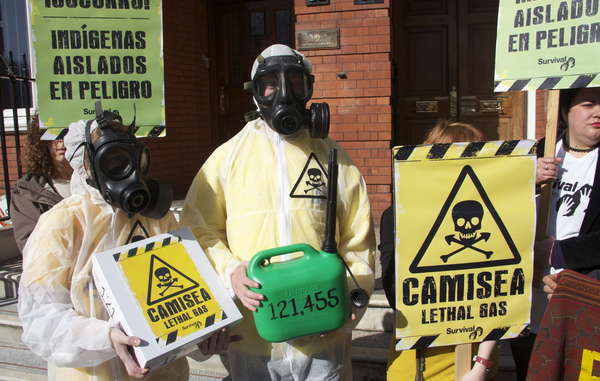Protesters in London wearing gas masks and carrying placards to symbolize the lethal effects of the Camisea project on Peru's uncontacted tribes.
© Survival
Survival International supporters held worldwide protests outside Peruvian embassies and consulates in London, San Francisco, Berlin, Madrid and Paris today, calling for an end to the deadly expansion of the Camisea gas project in Peru’s Amazon rainforest. Camisea threatens the lives of uncontacted Indians.
Protesters in London and Madrid, dressed as gas workers with masks and helmets, carried placards symbolizing the lethal effects of the Camisea project. The protesters handed oil canisters filled with the names of 120,000 people to the Peruvian embassies and consulates, asking Peru’s President to stop outsiders and companies from invading uncontacted tribes’ land.
Peru’s government is on the brink of approving a huge expansion of the notorious Camisea gas project which would penetrate further into the Nahua-Nanti Reserve, home to several uncontacted and isolated tribes.
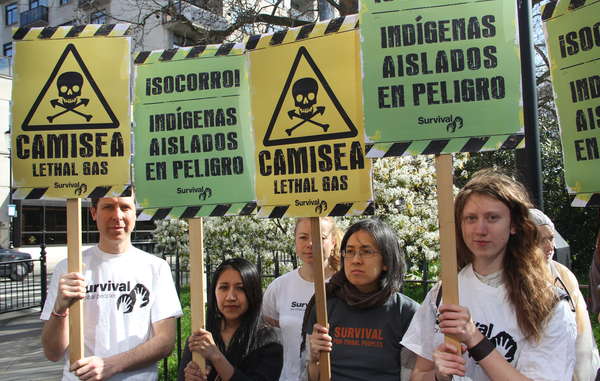
Protesters called for an end to the expansion of the Camisea gas project.
© Survival
Camisea already lies in the heart of the Nahua-Nanti Reserve, which is the buffer zone to the Manu National Park, considered by UNESCO to be ‘the most biodiverse place on earth’. It is Peru’s largest gas project, and is run by Argentina’s Pluspetrol, US’s Hunt Oil and Spain’s Repsol.
The UN recently called for the ‘immediate suspension’ of the Camisea expansion over the risk it represents to the lives of uncontacted tribes living nearby.
Uncontacted Indians are extremely vulnerable to diseases brought in by outsiders – initial exploration in the Camisea block in the 1980s led to the deaths of half the Nahua tribe.
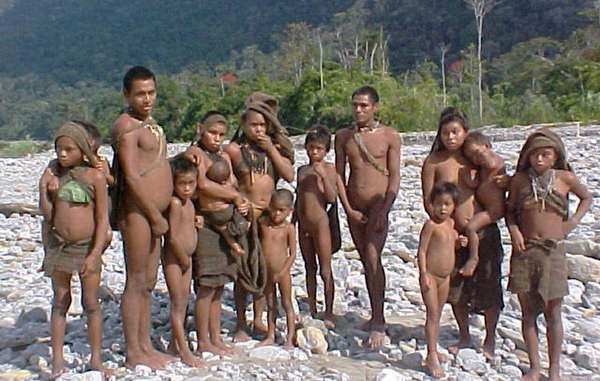
The expansion of the Camisea gas projects would threaten the lives of uncontacted tribes in the Nahua-Nanti Reserve.
© Survival
Survival’s Director Stephen Corry said today, ‘The UN wants to suspend the Camisea expansion. Thousands of people worldwide are against it. International law prohibits it. So why is this lethal project still on the cards? Not only is the government putting its reputation in jeopardy, it’s guilty of breaking international law.
Note to editors:
- The protest in San Francisco, California, will be held later today at 9am PST.
- Download the letter handed to the Peruvian embassies and consulates (pdf, 882 KB).
- High resolution images of the worldwide protests will be available for download here:
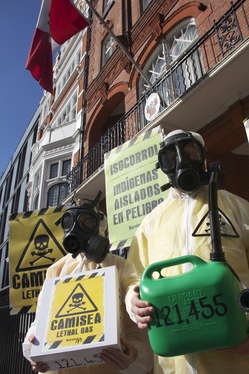
Protesters in London wearing gas masks and carrying placards to symbolize the lethal effects of the Camisea project on Peru's uncontacted tribes.
Download hi-res image
Credit: © Survival
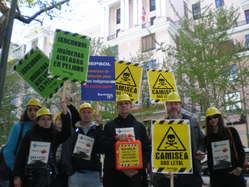
Protesters in Madrid wearing helmets and carrying placards to symbolize the lethal effects of the Camisea project on Peru's uncontacted tribes.
Download hi-res image
Credit: © Survival
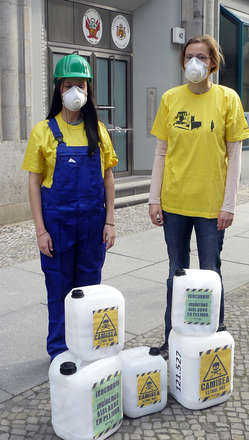
Protesters in Berlin wearing masks and helmets to symbolize the lethal effects of the Camisea project on Peru's uncontacted tribes.
Download hi-res image
Credit: © Survival
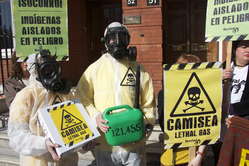
Protesters in London wearing gas masks and carrying placards to symbolize the lethal effects of the Camisea project on Peru's uncontacted tribes.
Download hi-res image
Credit: © Survival
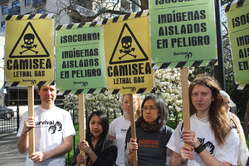
Protesters in London carrying placards to symbolize the lethal effects of the Camisea project on Peru's uncontacted tribes.
Download hi-res image
Credit: © Survival
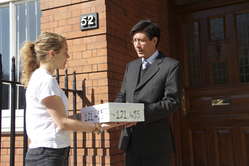
Protesters in London handed in a petition to ask Peru's President to protect uncontacted tribes from invaders on their land.
Download hi-res image
Credit: © Survival
Read this online: http://www.survivalinternational.org/news/9171
Indonesian military ‘development’ program spreads fear in West Papua
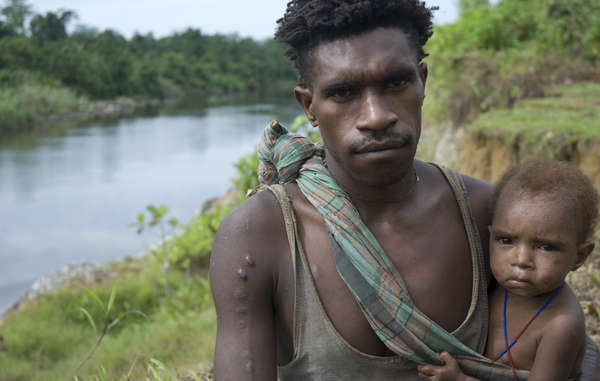
The military presence in West Papua is almost always accompanied by human rights violations such as killings, arbitrary arrests, rape and torture.
© Survival International
Papuan leaders have voiced their concern at plans for more than a thousand Indonesian soldiers to build 1,500 km of new roads in the next two years to accelerate ‘development’ in West Papua.
The government claims that unrest in the region is caused by a lack of ‘development’, while Papuans blame their problems on the violation of their political and human rights. Survival International and many Papuans fear that the influx of soldiers will bring neither development nor peace to the region.
One Papuan leader, Rev Socratez Yoman, told Survival, ‘The West Papuans do not need big roads, but a better life on their own land, without intimidation, terror, abuses and killings’.
Another leader, Markus Haluk, warned that the roads would open up the forests to illegal logging, much of it likely to be at the hands of the military.
The military presence in West Papua is almost always accompanied by human rights violations such as killings, arbitrary arrests, rape and torture.
So-called ‘development’ has already inflicted enormous damage to the Papuan people. Despite the presence of the world’s biggest gold mine, West Papua remains the poorest region in Indonesia with an HIV/AIDS rate thought to be 20 times higher than the rest of the country. Many of the cases of HIV/AIDS can be traced back to the commercial sex industry, which has accompanied the arrival of migrant workers in the fishing, logging and mining industries.
Many Papuans believe that the military have a vested interest in introducing HIV/AIDS in West Papua and see it as an attempt at ethnic cleansing. In some areas the military have supplied alcohol and prostitutes to bribe tribal leaders in order to gain access to their land and its resources. The disease is devastating some tribes. Rates are especially high in areas where so-called ‘development’ has already taken place, such as close to the US- and British-owned Grasberg mine.
Survival International is calling on the government of Indonesia to end human rights violations in West Papua and to enter into meaningful talks with the Papuan people so they are able to decide their own way of life, their own development priorities and their own future.
For more information about the impact of imposing ‘development’ on tribal people see Survival’s campaign Progress Can Kill.
Read this online: http://www.survivalinternational.org/news/9173

